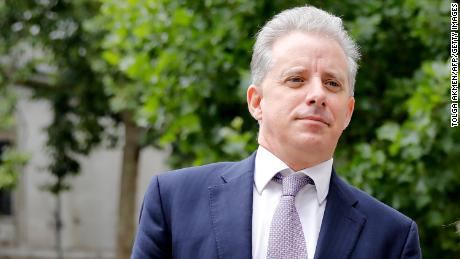The accusation — which Durham couched in vague, technical language in a court filing late Friday — has been seized upon by Trump and his supporters, who claim the former President was subjected to a smear campaign.
Durham says in the filing that Michael Sussmann, the Democratic lawyer, spoke about internet data related to Trump in a meeting with a federal agency, which sources say was the CIA, more than five years ago. Sussmann claimed the information “demonstrated that Trump and/or his associates were using supposedly rare, Russian-made wireless phones in the vicinity of the White House and other locations,” according to the filing.
Durham’s office said it found nothing to support the allegation. The special counsel also noted that the data showed a Russian phone provider connection involving the Executive Office of the President “during the Obama administration and years before Trump took office.”
The data was compiled by a tech firm that had special access to the purportedly suspicious internet data through an “arrangement” with the US government, and that firm was in touch with Sussmann, according to the filing.
An executive at the tech company, Rodney Joffe, and his associates exploited this arrangement by mining domain name system traffic associated with the Executive Office of the President and other data “for the purpose of gathering derogatory information about Donald Trump,” Durham’s prosecutors wrote.
Joffe is not charged with any crime, and his lawyer hasn’t commented.
Sussmann has pleaded not guilty to charges of lying to the FBI. His lawyers declined to comment.
Durham’s office says in the filing that he plans to use the information in it at Sussmann’s trial. Durham’s office declined to comment further.
Right-wing media outlets and Republican politicians, including Trump, are citing Durham’s court filing to accuse Hillary Clinton’s 2016 campaign of spying on Trump because of the use of the data.
But Durham’s court filing doesn’t allege that the pro-Clinton researchers use of internet data meant that there was any eavesdropping on content of communications.
Durham has used the Sussmann case to more broadly draw attention to the role of unsavory political opposition research in the 2016 election.
Sussmann is charged with making a false statement to the FBI about his representation of the Democrats, when he shared data that pro-Clinton researchers believed linked Trump Organization servers to a Russian bank in 2016.
The five-year statute of limitations appears to have passed for Durham to accuse Sussmann of any wrongdoing related to his meeting with the CIA. Passing along information from researchers to intelligence officials for further investigation is not uncommon and isn’t necessarily a crime.
The new details were included in a more mundane request to have Sussmann agree to waive any conflict-of-interest issues that could arise because his lawyers have represented others connected to the investigation in the past.
Sussmann is set to go to trial in a few months, and the case is largely expected to be based on the testimony of former FBI General Counsel James Baker, who has made shaky statements in testimony over the past few years about his memory of his interactions with Sussmann.






